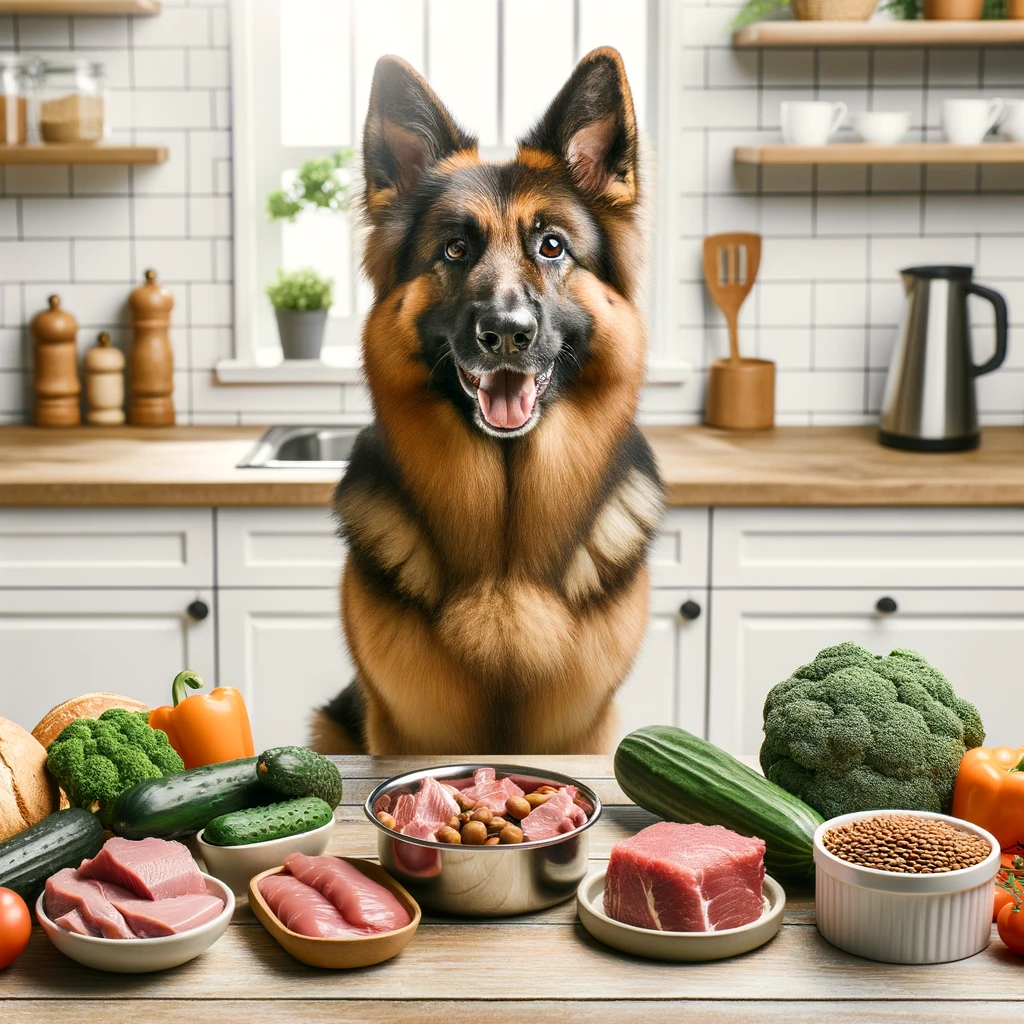What Do German Shepherds Eat?

German Shepherds have a varied diet, including high-quality commercial dog food, meats like chicken, pork, beef, and eggs, and vegetables and grains.
They can also eat many human foods, such as peanut butter, carrots, cooked fish, apples, and oatmeal.
Understanding their dietary needs is crucial due to their high energy levels and specific nutritional requirements.
The Basic Diet of a German Shepherd
The diet of a German Shepherd consists of a combination of animal protein, fats, complex carbohydrates, and fiber. This blend helps support their active lifestyle.
The breed originated in the Alsatian Region of Germany, where they consumed beef, wheat, and leafy greens such as cabbage.
The Importance of Protein and Fats
Proteins and fats are essential in a German Shepherd’s diet. Protein in meats like chicken and beef is crucial for muscle development and energy.
Fats, particularly those found in fish oil and flaxseed, are essential for maintaining healthy skin and a shiny coat.
Suitable Vegetables and Grains
Vegetables and grains provide essential vitamins, minerals, and fiber, aiding digestion and health. Safe vegetables for German Shepherds include carrots, peas, and sweet potatoes.
Grains like brown rice and oatmeal offer a good energy source and are easy on their digestive system.
Human Foods That Are Safe
Many human foods are safe and beneficial for German Shepherds. These include peanut butter, cooked fish, apples (without seeds), and carrots. These foods can be used as treats or supplements to their regular diet.
Preferred Foods for German Shepherds
German Shepherds, known for their robust nature and high energy levels, enjoy a variety of foods that cater to their nutritional needs.
Here’s a list of foods that German Shepherds commonly favor:
- Lean Meats: They typically enjoy lean meats like chicken, beef, turkey, and lamb, which provide essential proteins for muscle strength and energy.
- Fish: Many German Shepherds like fish, which is a good source of omega-3 fatty acids for healthy skin and coat.
- Eggs: Cooked eggs can be a nutritious treat, offering a good source of protein and vitamins.
- Rice and Grains: Brown rice and whole grains like barley and oats are often well-tolerated and provide carbohydrates for energy.
- Vegetables: Vegetables such as carrots, green beans, peas, and pumpkin are not only enjoyable but also supply fiber, vitamins, and minerals.
- Fruits: Apples (without seeds), bananas, and blueberries can be tasty and healthy snacks in moderation, offering vitamins and antioxidants.
- Dairy Products: Some German Shepherds may enjoy small amounts of plain yogurt or cottage cheese, which provide calcium and probiotics.
- Commercial Dog Food: High-quality commercial dog foods, both dry and wet, are designed to meet their nutritional needs and are often a staple in their diet.
- Specialty Dog Treats: Various commercially available dog treats, especially those made with natural ingredients, are usually well-received.
- Peanut Butter: Plain, unsweetened peanut butter is a favorite treat for many German Shepherds, but it should be given in moderation.
It’s important to remember that while these foods are generally safe for German Shepherds, each dog’s preferences and dietary tolerances may vary.
Introducing new foods should be done gradually, and it’s always best to consult a veterinarian for personalized nutritional advice.
Foods German Shepherds Should Avoid
German Shepherds, like all dogs, have specific dietary restrictions. It’s essential to be aware of foods that can harm them.
Here’s a list of items that German Shepherds should not eat:
- Chocolate: Contains theobromine, which is toxic to dogs and can cause heart problems, seizures, and even death.
- Grapes and Raisins: Can cause kidney failure in dogs.
- Onions and Garlic: Can lead to anemia by destroying red blood cells.
- Avocado: Contains persin, which can cause vomiting and diarrhea in dogs.
- Alcohol: Even small amounts can cause intoxication, leading to vomiting, diarrhea, difficulty breathing, coma, and potentially death.
- Caffeine: Found in coffee, tea, soda, and energy drinks, caffeine can be fatal for dogs.
- Xylitol: A sweetener used in many sugar-free products, it can cause liver failure and a drop in blood sugar.
- Macadamia Nuts: Can cause weakness, depression, vomiting, tremors, and hyperthermia.
- Dairy Products: Many dogs are lactose intolerant and can have digestive issues after consuming dairy.
- Raw/Undercooked Meat, Eggs, and Bones: Can contain harmful bacteria and pose a choking hazard.
- Yeast Dough: This can expand in a dog’s stomach, causing pain and potentially leading to ruptures.
- Salty Snacks: Excessive salt intake can lead to sodium ion poisoning.
- Artificial Sweeteners and Additives: Some can be toxic or cause digestive upset.
- Fatty Foods: Can cause pancreatitis and other digestive issues.
- Corn on the Cob: The cob can cause intestinal blockage if ingested.
This list provides a guideline of foods to avoid feeding your German Shepherd to maintain their health and well-being.
Always consult a veterinarian if you are unsure about certain foods or notice any adverse reactions in your dog after consuming a particular item.
German Shepherd Puppy Diet Plan
When it comes to feeding a German Shepherd puppy, a well-balanced and nutritious diet is essential for their healthy growth and development.
These puppies have specific nutritional needs that differ from adult dogs due to their rapid growth.
Here’s a diet list to help guide you in providing the best possible nutrition for your German Shepherd puppy:
- High-Quality Puppy Food: Choose a high-quality commercial food specifically formulated for large breeds like German Shepherds. This food should have a good balance of proteins, fats, and essential nutrients.
- Protein Sources: Include good quality protein sources like chicken, lamb, or fish. These proteins are crucial for muscle and overall body development.
- Carbohydrates and Fiber: Carbohydrates such as rice and barley provide energy, while fiber sources like sweet potatoes and pumpkin aid digestion.
- Healthy Fats: Fats are essential for energy and healthy skin and coat. Look for foods containing fish or flaxseed for the Omega-3 and Omega-6 fatty acids.
- Vitamins and Minerals: Ensure the puppy food contains essential vitamins and minerals to support bone growth and immune health. This can include calcium, phosphorus, and essential vitamins like A, D, and E.
- Puppy Treats: Use treats specifically designed for puppies, which can benefit training. Ensure that treats do not exceed 10% of your puppy’s daily food intake.
- Fresh Water: Always provide access to fresh, clean water. Proper hydration is essential for all aspects of health.
Remember, the dietary needs of each German Shepherd puppy may vary, and it’s always recommended to consult with a veterinarian to tailor a diet plan that suits your puppy’s specific needs and health conditions.
Regular check-ups will ensure your puppy is thriving and receiving the proper nutrition.
Training Your German Shepherd to Avoid Harmful Foods
Training your German Shepherd to avoid harmful foods is crucial for their health. Dogs can be naturally curious and might try to eat dangerous items.
This guide will offer concise strategies to help your dog learn to identify and steer clear of unsafe foods.
- Start with Basic Commands: Teach your German Shepherd basic commands like “leave it” or “no.” These commands are essential in instructing them to stay away from certain foods.
- Use Positive Reinforcement: Reward your dog with treats or praise when they obey the command to leave forbidden food alone. This positive reinforcement encourages them to repeat the desired behavior.
- Create Controlled Scenarios: Set up controlled situations where you place harmless but forbidden food items on the floor and use the command to prevent them from eating.
- Consistency is Key: Consistency in training is crucial. Repeat the exercises regularly until your German Shepherd consistently responds to the commands.
- Teach Recognition of Unsafe Foods: Gradually introduce representations of unsafe foods during training sessions, teaching your dog to recognize and avoid them.
- Supervise and Redirect: Always supervise your German Shepherd during meal times and in areas where harmful foods might be accessible, redirecting them if they show interest in these foods.
- Consult a Professional Trainer: If you’re struggling with training, consider consulting a professional dog trainer for specialized techniques and guidance.
Caring for a Pregnant German Shepherd’s Diet
When caring for a pregnant German Shepherd, special attention must be given to her diet to ensure her well-being and the healthy development of her puppies.
Proper nutrition is crucial during this critical time. Here are seven key dietary considerations to keep in mind:
- Increase Caloric Intake: As the pregnancy progresses, gradually increase your German Shepherd’s caloric intake to meet the growing nutritional demands of her and her developing puppies.
- High-Quality Diet: Feed her a high-quality diet rich in nutrients, focusing on a balance of proteins, fats, and essential vitamins to maintain her health and support the puppies’ growth.
- Frequent, Smaller Meals: Instead of two large meals, offer smaller, more frequent meals throughout the day to help with digestion and reduce discomfort as her pregnancy advances.
- Avoid Overfeeding: While increased nutrition is essential, avoid overfeeding, which can lead to unnecessary weight gain and complications during delivery.
- Puppy Formula Food: Consider switching to high-quality puppy formula food in the later stages of pregnancy, as it’s designed to support both the mother and her puppies’ nutritional needs.
- Constant Access to Water: Ensure she always has access to fresh water, as her hydration needs will increase during pregnancy.
- Veterinarian Consultation: Regularly consult with a veterinarian to monitor her health and make any necessary adjustments to her diet, ensuring a healthy pregnancy and whelping process.
Feeding Practices and Tips for German Shepherds
A proper feeding regime is as crucial as the diet itself when it comes to the health and well-being of German Shepherds.
This section explores two critical aspects of feeding practices: the importance of a regular feeding schedule and ensuring adequate hydration.
Adhering to these practices will help maintain your German Shepherd’s optimal health and prevent potential health issues related to diet and nutrition.
Regular Feeding Schedule
Maintaining a consistent feeding schedule is essential. It helps in portion control and prevents digestive issues. Adult German Shepherds are fed twice a day.
Importance of Hydration
Ensuring your German Shepherd has constant access to fresh water is vital. This is especially important after meals and during exercise.
Consulting with Professionals
Consulting with a veterinarian or a veterinary nutritionist is recommended for any specific dietary concerns or creating a diet plan tailored to your German Shepherd’s needs.
In Conclusion
The diet of a German Shepherd should be well-balanced and tailored to their specific needs. It’s essential to include a variety of foods, such as high-quality commercial dog food, meats, vegetables, grains, and certain human foods, while avoiding toxic substances.
Regular consultation with a vet ensures that your German Shepherd’s dietary needs are met, supporting their health and well-being.

I’m Martin, and I grew up in the super cool city of Seattle. You know, the place with all the incredible mountains and forests? Yeah, that’s my playground!
Ever since I was little, I’ve been all about nature. I used to wander around the woods with a notebook, doodling all the cool plants and animals I’d find.
